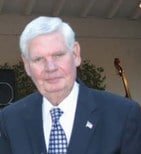 Bill Shover is a coach and central character in my story and made an indelible mark on my life. In fact, he is still an important influence. The truth is, when I was a 12-year old and met Bill, I was not in a great personal situation. My father had serious personal challenges and was pretty much out of the picture. I did not have a lot of reason to be confident in who I was, although from an early age I was mesmerized by sports and spent hours in the front yard shooting hoops and imagining that I was making the final shot to win the NBA championship.
Bill Shover is a coach and central character in my story and made an indelible mark on my life. In fact, he is still an important influence. The truth is, when I was a 12-year old and met Bill, I was not in a great personal situation. My father had serious personal challenges and was pretty much out of the picture. I did not have a lot of reason to be confident in who I was, although from an early age I was mesmerized by sports and spent hours in the front yard shooting hoops and imagining that I was making the final shot to win the NBA championship.
Bill Shover took me under his wing in the Kachina Little League in 1974. I got a sense pretty quickly that Bill had a process for what he was doing, a great spirit about what he was up to and a real compassion for the underachiever. I really felt like I was fortunate to be picked on his team.
Bill was encouraging and compassionate from the very beginning. His coaching approach was about working on the fundamentals and understanding the game. This approach instilled a certain amount of confidence because we kept repeating the fundamentals.
As Bill and I met recently, (30 years after being coached by him in little league), he recounted this story. He said, “When I started working with you, you were really not a very good hitter, but if you remember, we kept working and working on the fundamentals and eventually you began to get the bat on the ball and get them into the outfield for some very nice base hits. You really became a good hitter!”
He also shared that he was coaching his older son in American Legion ball at the time and that he was arm-twisted into taking a team in the minor leagues. Here I thought I had been so blessed to be picked by Bill Shover, but the truth of the matter was he got a minor league team with the bottom of the barrel players (the early version of the Bad News Bears). Luckily his son TA was a good ballplayer and Bill knew how to make ballplayers out of young boys who were a little lacking in the talent department.
That was an important step in my life. Through his patience, encouragement, support and process of practicing the fundamentals, I did in fact become a decent hitter.
A really great thing about Bill and his process was that he knew how to have fun. This is something I have carried through into my life and my executive coaching. When we have fun, or lightness as I like to call it, we tend to be better learners and are free to bring out our natural energy and talent.
Early on, Bill made it very clear that he was about playing players who worked hard. This was an expression of one of his values, a critical piece of coaching. I knew if I showed up at practice, worked hard and applied myself, Bill was going to give me my fair share of playing time and perhaps start me, even though I probably was not at the top of the talent list. Bill rewarded hard work and determination.
All of this led to a greater sense of self worth from my perspective. It felt good to have a champion like Bill rooting for me in my corner. He would cheer any time we did something right. He would also make sure to point out if we missed the mark. This is another hallmark of a great coach. They are attentive to details, both the positive details and the details for areas with room for improvement.
I was fortunate enough to have Bill draft me in a second and third season. By now he knew my commitment to improvement and I knew his system. I was a loyal fan, and he was a devoted coach helping me improve my baseball skills and personal confidence.
When Bill and I had lunch recently, he said to me, “I had 334 kids and not one of them tried harder than you.” Imagine how great that felt and here he is in his 70s, I am in my 40s and he is still coaching me and contributing in a very positive way. What a special relationship.

